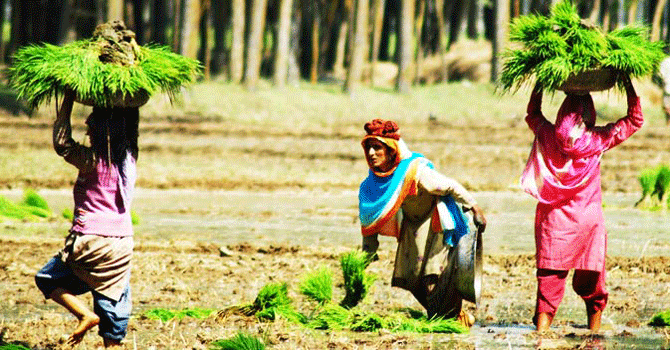Threat to basmati rice export
 The
Rice Exporters Association of Pakistan announced crossing $2
billion mark in foreign sales. Its officials listed the
seasonal problems that confronted the association and the
efforts it made to defeat them to reach the benchmark.
The
Rice Exporters Association of Pakistan announced crossing $2
billion mark in foreign sales. Its officials listed the
seasonal problems that confronted the association and the
efforts it made to defeat them to reach the benchmark.
They are right, but up to a point, when they say that
debilitating energy crisis and discouraging law and order
situation threatened export process this year like never
before. It is also true that India entered the rice market
with a huge surplus and 20 per cent devaluation of its
rupee, giving it almost unbeatable comparative advantage
against Pakistani exporters. To make the competition even
tougher, India withdrew the minimum export price (MEP).
Other competitors like Vietnam and Myanmar posed stiff
competitive challenges. The State Bank of Pakistan (SBP)
also quietly honoured sanctions against Iran, resulting in
drastic drop in basmati exports to it. But the exporters
still maintained their share and were able to achieve the
mark.
But, primarily Pakistan’s rice export is turning out to be a
failure, especially when taken in the backdrop of its
projected potential. The exports are stagnant for the last
many years, both in quantitative and value terms – hovering
around four million tons in quantity and $2 billion in
worth. Are both these figures satisfactory? Certainly not!
Especially when taken in the backdrop of Indian success in
doubling its export of basmati.
Pakistan’s rice exports have developed some permanent
features (some call them deterrents) that include: poor
quality and poorer international prices, failure to develop
brand and retail market share and permanently and
dangerously, narrow base of exporters. For the last few
years, however, a new, and perhaps the most lethal, factor
has crept in the export process — increasing uncertain
future of basmati variety.
The entire rice export regime of the country has
traditionally been based in this variety, which gave it a
natural competitive edge in world market. Certain
geographical attributes made it the most ‘sought after
variety’ and the world paid premium for its natural traits –
taste and aroma.
Of late, this main pillar of rice export, however, has come
under threat because of short-term greed of a small bunch of
exporters and traders. They regularly manipulate market to
deprive everyone of his share of profit. Precisely for this
reason, the variety is increasingly loosing its economic
sheen — particularly for farmers. With the loss of
commercial attraction, farmers are increasingly abandoning
the crop.
Last four years acreage reflects farmers’ loss of interest.
In 2008-09, the variety was sown on 3.82 million acres. In
2009-10, area dropped to 3.49 million acres in Punjab, where
the variety can be sown. Next year, it came down to 3.29
million acres, and last year it was reduced to 2.77 million
acres. Where would this decline stop?
With loss of area, decline in production is only natural –
especially when there has neither been any breakthrough in
seed nor in production process. In 2008-09, Punjab produced
2.6 million tons of basmati. In 2009-10, it came down to
2.47 million tons.
Next year, it was 2.36 million tons which dropped to 1.88
million tons last year. Its share in export dropped from 1.2
million tons to just over 900,000 tons during the same
period.
With basmati on a decline, would Pakistan be able to sustain
its rice export? Most probably it would not. Without
basmati, it will have to compete in hybrid varieties where
it simply stands no chance for a number of reasons. Far East
countries, like China, which produce those varieties, have
already leapt generations ahead — both in technology and
seeds varieties. They have gone into super hybrid regimes
and getting yield of over 200 maunds per acre, against a
paltry 70 maunds in Pakistan. With that kind of yield
differential, would Pakistan ever be able to maintain any
competitive advantage in the world market?
Apart from financial dimension, the varieties like basmati,
which could only be produced in certain geographical
environment, are considered common human heritage. No
country is allowed to damage them, deliberately or though
neglect. Pakistan, on the one hand, is fighting a legal
battle with India, insisting that basmati could only be
produced in 15 districts of central Punjab due to particular
geographical signatures. On the other hand, it is allowing
influential domestic players to manipulate the entire
variety out of existence.
The world sensitivity to such heritage is reflected in the
regime of patents under the World Trade Organisation (WTO).
Such patents save local varieties in each and every part of
the globe because they bring diversity of taste, intellect
and employment to million of people. Every host nation is
allowed to charge a premium on such varieties. Instead of
building on this natural advantage, Pakistan seems to be
bent upon loosing it – that too for greed of the few.
The country cannot shift to hybrid regime for two reasons:
domestic consumption pattern and price differential between
the two. Pakistanis are a basmati consuming nation. The
hybrid varieties even cause social stigma.. Thus, a part of
acreage would always be spared for basmati. Why let a
variety slip out of hands when it is matter of social,
dietary and economic realities?
Price differential between basmati and hybrid in
international market would also provide a compulsion for
Pakistan to save this variety. It is sold in world market at
almost three-time higher price than other hybrids. All these
points make basmati integral part of social and economic
life. This natural advantage needs tending, not
strangulation.
Courtesy: The DAWN